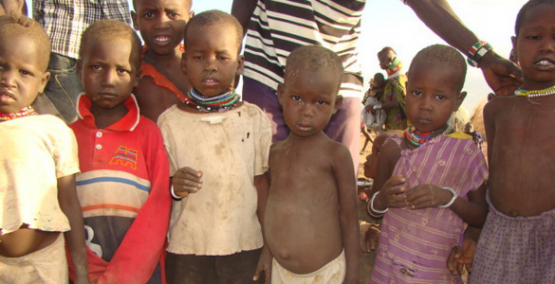
Saving Lives Still Possible in Horn of Africa: Salesian Missions Urges Donations, Says “We Must Not Be Discouraged”
NAIROBI, Kenya (September 22, 2011) – A famine of massive proportions threatens 12.7 million people in the Horn of Africa who are in urgent need of emergency assistance, according to the U.S. State Department. Aid agencies continue to sound the alarm, warning that the death toll could continue to rise—possibly reaching several hundred thousand in the coming weeks alone.
The reality of the situation in the Horn of Africa is unimaginable, and those working in the crisis zone struggle to provide critical information to the outside world, while also trying to save lives.
The international community’s reaction to the signs of massive famine in the Horn of Africa came too late, say the Salesians of Don Bosco in Ethiopia. Refugee camps throughout the region are filled with tens of thousands of people in desperate need. The camp locations are extremely remote, with workers reporting they feel isolated and cut off from the rest of the world. Warnings of a famine disaster began in December 2010 but “nobody was listening,” said Mattia Grandi, a local project coordinator for the Salesian relief efforts told EWTN News.
Getting up-to-date information is a challenge even for humanitarian organizations who were already established in the famine zones, says Father Mark Hyde, executive director of Salesian Missions, the U.S. arm of the Salesians of Don Bosco. “Our missionaries working in the thick of the crisis are trying their best to send reports. But as expected, they must first attend to the immediate needs of the children and adults dying of malnutrition. Every second counts.”
Photographs that have made their way out of the isolated region tell stories that words simply cannot. The images are surreal, given the severe nature of the famine and the large numbers of people in desperate need of assistance. The realities of the situation are hard for anyone to process, even those who devote their lives to helping the poor and providing emergency aid.
“Long lines stretch from our refugee camps,” says Fr. Hyde, describing scenes from such photographs from the five Salesian refugee camps in the region, where an estimated 150,000 people are living in in desperate need of food and water.
“People of all ages waiting patiently for help. There is no visible sign of panic on their faces as malnutrition has sapped their energy and their spirits. Many of the victims are so frail, it is only a matter of days or even hours before they succumb to the starvation.”
Humanitarian organizations like Salesian Missions are urging people to help even though the situation may be overwhelming or seemingly hopeless. Although, the death toll is expected to be large, donations can and do make a difference, says Fr. Hyde. “Many lives can still be saved, we must not be discouraged.”
During recent weeks, the Salesians participated in the delivery of 49 tons of food to North Horr in Kenya, consisting of 25 tons of corn, 10 tons of beans, 10 tons of fortified flour, 3 tons of rice and 1 ton of cooking fat. An additional 25 tons of food were sent to Lodwa-Turkana – including corn, beans, cooking oil, peas, flour, biscuits and powdered milk.
Currently, Salesian Missions is providing 2,000 food rations each day and 10,000 liters of water twice a day. An international campaign launched by the Salesians is aimed at helping almost 4 million people living in the region. Donations can be made by going to www.SalesianMissions.org.
